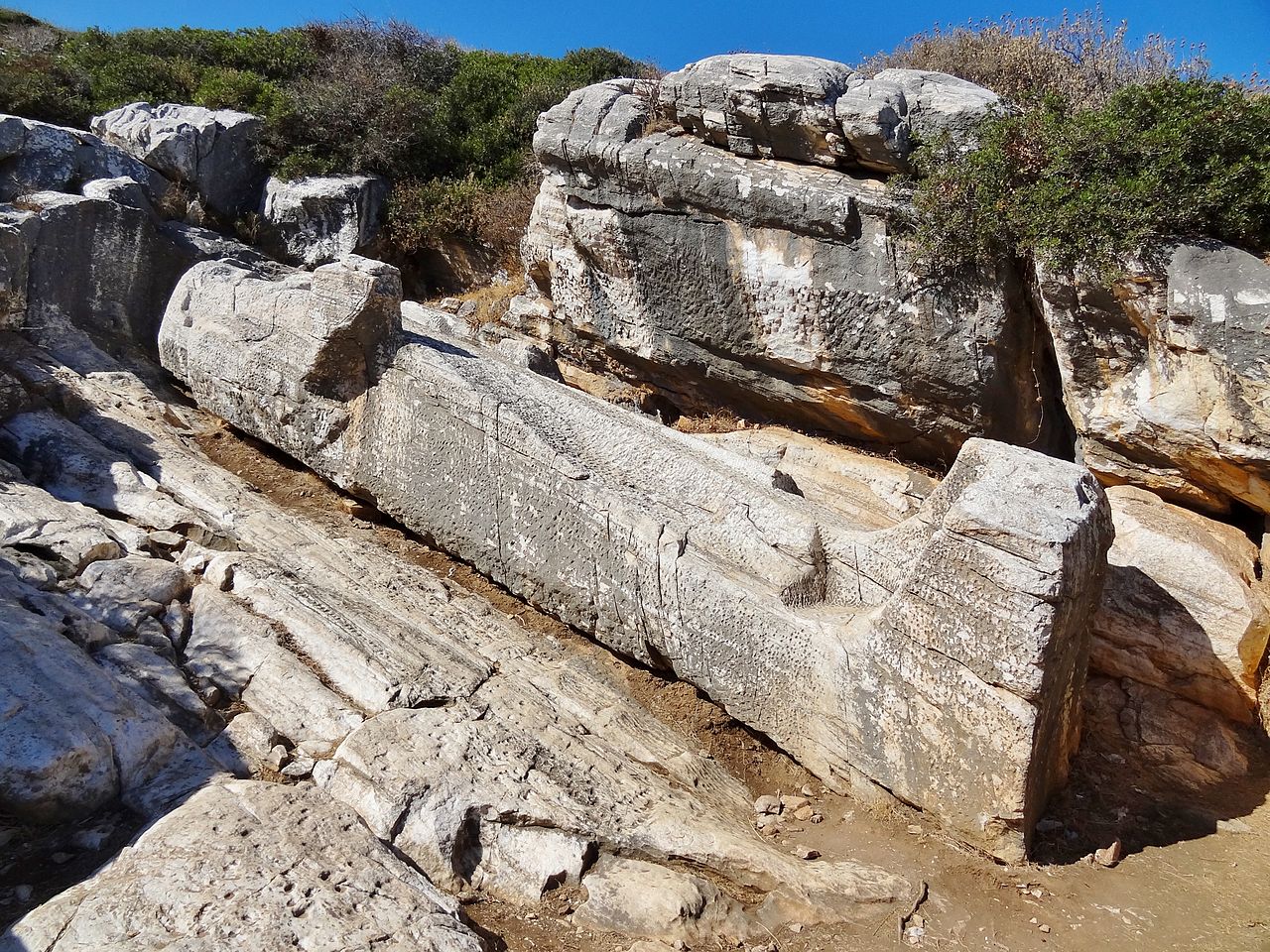
Louisiana Anthology
David Havird.
Poems.
© David Havird.
Used by permission.
All rights reserved.
“WEATHER ON NAXOS”
The god, his humors petrified as veins
in roughhewn marble, was going down
feet first from the quarry, down to the port
where there is now a whitewashed village — from there
to the other side of the sea,

Kouros of Apollonas. From
Wikipedia.
which moves in front of the tables,
the wobbly blue and white taverna,
only enough to glisten. I climbed
until I had the whole of him at my feet.
I had as well as a wedge of spinach pie
a plastic half-liter of Naxian red.
It came to me to stream a swallow down
on that colossal archaic rockhead,
effaced though he had been by wind and rain —
as also sprang to mind this god
as a fidgety infant snug in the crook of an arm,
his older brother jangling grapes
to disenthrall the spirited boy
from who knows what is making him fuss, while I’d
inspirit a lull, would rouse the weather
inveined in coolheaded marble. Up
the mountainside, the flight of slippery
marble slabs, into the quarry
schoolchildren surged, to scramble up
the unfinished god, to scurry over him,
between the stubs of reaching arms to plop,
from bearded chin to feet (a pedestal
this column never stood on, much less danced
as Dionysus) to heel-walk slide —
a revel of wind and rain in the vineyards.

“MOLTING”
Before dawn even, zipping past the exit
to Myrtle Beach … That’s where my girlfriend was
who had a summer job there singing.
But I was heading north
to see Janet. Hot and muggy, the weather
changed at Richmond to rainy,
not with a torrent of blades but a drizzle of pins,
and chilly. I had to borrow a flannel shirt
from Janet — a man’s, which fit me. Janet was renting,
along with her college roommate
and one other girl, a townhouse in Georgetown.
Sometimes, while they were at work,
I’d venture afield to a gallery,
Corcoran, Phillips; mostly I browsed
the neighborhood bookstores and otherwise loitered.
I had to ask the girls, because I was getting
so many probing looks from guys,
if maybe I had an effeminate manner.
“You have,” she said, the matronly one whose name
escapes me, “just a nice face.” I slept
on the living-room sofa. Sunburned, itching like mad,
I’d scroll the peeling skin off my shoulders
and roll it into a little ball,
then flick it. Overhead, the women
were getting ready for bed, their heels
conveying thunder while I read by lamplight
a poem in Harper’s by Robert Penn Warren,
whom Janet and I and her housemate Felicia had met:
“A Problem in Spatial Composition,”
in which a hawk, like something divine,
unseen above a window-framed vista
composed of a stone scarp and forest,
at sunset enters the frame as if from forever
only to go “in an eyeblink.” My wife,
who was then my girlfriend, who sang at the beach
where noontide had blistered my shoulders —
my wife says it’s all about sex. Not Warren’s poem,
this story of mine. The thunder, having slung
flimsy bras across the shower rod,
puts up its feet — the women, nesting. Molting,
I clasp the neck of that shirt, whoever’s it is,
which I’ll shake out in the morning.
The weather whistles past windowsills
and under the door, and though it sings
like blades’ cold steel, I picture
within the lamplight’s moon on the ceiling
a hawk whose shrills are high noon’s killing rays.

“WEDDING WIND”
Beyond the pines, which hid, except for the chimney,
a closed-off-season beachside taverna,
from up on the slope where, relics ourselves,
we lodged in a derelict windmill,
the blue looked firm enough to float a rock
without a ripple of worry. Even so,
my gaze, as though white-robed, a savior,
skimmed to the boat in the cove,
then stepped from the solid blue of the bay
to shelves of bluer schist, a pilgrim,
on up to the whitewashed church on its finger of rock
to exchange with the icon a kiss
for a healing look from the Virgin. Wind
by evening. We took our sunset walk
around the wind-chopped cove,
the sailboat-pitching cove,
along the cliffside path
despite not only the wind but also the crowd
thronging the church. A wedding, yes.
Among the dusty cars that choked the lot
was one in a wind-whipped frenzy
of streamers. The spirit aroused, of course, in us
a vision of ours. By ten, electric guitars
were yowling. The pines — were they dancing with wind
or light from the woken taverna? The wind
swelled with the odor of meat fat sizzling on coals;
the taverna was smoking. Or wasn’t it thunder
that shook us, that fiendish, vibrating bass,
and cats, the feral ones fed by our landlord
to battle the vipers, serpents of lightning?
In bed as though on board,
we drowsily hoisted a sail
too suddenly pregnant with wind — our rope-burned hands
like urgent semaphores, like creaking blades
up on the slope conducting the wind.
Text prepared by:
- Bruce R. Magee
Source
Havird, David. Weathering: Poems and Recollections. Macon, GA: Mercer University Press, 2020. © David Havird. Used by permission. All rights reserved.
“Weather on Naxos” first appeared in Ergon; “Molting” in Literary Matters; and “Wedding Wind” in The Hopkins Review.

L’Anthologie Louisianaise